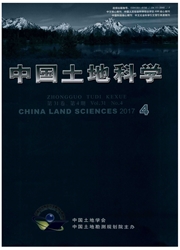

 中文摘要:
中文摘要:
研究目的:以“土地租金剩余”为切入点,从促成城中村形成的三个行为主体的角度,探究城中村问题产生的微观动因。研究方法:城市经济学与土地经济学分析方法。研究结果:城中村问题是地方政府、集体经济组织和村民三方力量共同追逐“土地租金剩余”的结果,是相关利益主体的理性选择;城中村“土地租金剩余”的产生,源于城乡二元土地制度。研究结论:城中村问题的解决,需要逐步改善城乡土地管理中的二元结构状况,实行集体土地和国有土地的“同地、同权、同价”,逐步建立城乡统一的建设用地市场,严格限定公益性用地的征收范围,强化对农民土地权利的物权保护,让农民以土地财产权利参与城市化进程。
 英文摘要:
英文摘要:
The purpose of this paper is to explore the micro-level driving forces of the emerging of urban villages, which is analyzed by judging the related three types of actors' strategies on seizuring the land rent residuals. The research methods include urban economics and land economics. The results show that the reason of urban village emergence consists in the pursuit of land rent residual by local government, collective economic organization, and village members, which is the rational choice of the main stakeholders. The land rent residuals in urban villages arise from the China's dual-land-system. The research concludes as follows:( 1 )in order to solve the urban village problem, the dual structure in urban-rural land administration must be gradually improved; (2)land plots, whether collective-owned or state-owned, should be treated as equal prices and equal rights; (3)a unified urban-rural construction land market should be gradually established;(4)land expropriation scope for public welfare should also be strictly limited;(5)farmers' property right should be proteeted;(6)and to allow the farmers' participation in the process of urbanization with their rights.
 同期刊论文项目
同期刊论文项目
 同项目期刊论文
同项目期刊论文
 期刊信息
期刊信息
